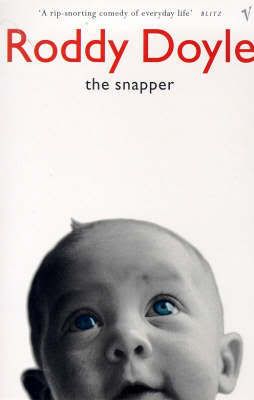
Confession: I have terrible fashion sense. If I ever get a book advance over $500,000, I'm going to dedicate 5% of that to hiring someone to help me revamp my entire wardrobe. Someone with taste.
Reading:
- The Van, by Roddy Doyle
- "Ferian Fetlock Cures a Horse"
- "Dolly Hobbles"
I just finished The Snapper by Roddy Doyle this morning, during the time that (according to yesterday's schedule) I was supposed to be revising "Dolly Hobbles." For shame. Still, if I do that this afternoon, then I'll have tomorrow to dip into old Ferian pretty heavy. Maybe.
Reading The Snapper got me to thinking about what "story" is, at least in relation to plot. I say this because The Snapper is a story that I could not have written. And I'm not talking about the Irish slang, either; it's a story that, in some sense, could be written in any poor, urban area with strong ties of community and a penchant for gossip. The Barrytown setting gave it flavor, but not substance.
No, it's the way an entire novel was written about a pregnancy. The baby itself is born in the last page, and serves as a denouement to the story, not even a vital part. And the plot is simple. Sharon is pregnant, and she tells her parents, then her friends. They are all remarkably okay with it, although her father does have some issues later on, which they deal with. The identity of the father gets out and causes some problems, but thanks to a lie no one believes but everyone pretends to, it turns out pretty much okay.
I could never have made that interesting. Ever. Because the scenes dealing exclusively with the plot don't really make up the story.
The story is about the Rabbitte family. The story is about Sharon in relation to her community, the whole family in relation to the community. It's a journey for Sharon's father, Jimmy Sr., and to a lesser extent for her mother Veronica. But pretty much all of her siblings get a plot thread that carries through the whole story. All of these elements work together to make the story, and make Sharon's predicament matter. Because we know her siblings, her parents, her friends, we actually care about her. We laugh along with her ribald jokes when she's with her friends, and we tremble with her when her baby daddy tries to lure her to a life with him in London.
This is not a story about a pregnancy, even though it's a plot about a pregnancy. This is a story about character. Sharon has to overcome her concern for how she appears in the eyes of the neighborhood... and so does her father. They do this different ways, but they do so successfully, and the story thus becomes a triumphant one.
And this is remarkable, all the more so given the somewhat appalling conditions in which Sharon lives. We see her excessive drinking during the pregnancy, even up to the last week, and we have one more reason than Sharon does to worry that the child won't be born healthy. We see Jimmy's self-indulgent attempted manipulation of Sharon, to try to wrangle out an apology, yet we still somehow sympathize with him.
It's remarkable because we see all these things through the eyes of the participants, and we can see the love and affection the characters have for each other. We see this through the filter of the culture in which it is set, without judging them too harshly.
The final novel in the trilogy, The Van, focuses on Jimmy after he loses his job. (I'm only a page into the story, now, so I can only echo what I've been told about it.) But again, that's just the plot, and I can't wait to find out what the story is about.
No comments:
Post a Comment